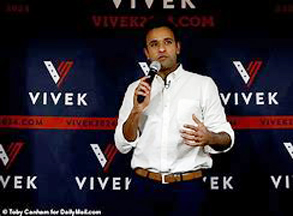WASHINGTON, D.C. (TIP): Republican presidential candidate Vivek Ramaswamy, 37, has emerged as a prominent voice against affirmative action and what he terms “preferences” in college admissions and hiring. His campaign has revolved around the idea of promoting “pure merit” and ending race-conscious policies. However, it has come to light that Ramaswamy’s past reveals a significant contradiction in his stance, says Kali Holloway.
Ramaswamy’s opposition to affirmative action has been one of the main pillars of his presidential campaign, alongside his fight against “wokeness.” He has criticized race-based admissions as a “cancer on our national soul” and pledged to end them if elected president. Curiously, Ramaswamy received substantial support from the Soros Fellowship for New Americans in 2011 during his time as a graduate student at Yale Law School, according to The Daily Beast. The fellowship, backed by the family of George Soros, is intended to provide opportunities and equity to immigrants and children of immigrants, aiming to level the playing field for historically marginalized groups.
Despite receiving support from the fellowship, Ramaswamy seems to have attempted to distance himself from it. The media reported, citing a Mediate story by Isaac Schorr, that he paid to have information about the fellowship removed from his Wikipedia page. This move raises questions about the candidate’s discomfort with his own association with a program that aligns with the very principles he opposes.
The fellowship’s selection process reflects a holistic approach, considering factors beyond just academic grades, aiming to support students who have overcome obstacles and demonstrated potential for success. This approach bears resemblance to the admissions process used by institutions like Harvard, which considers various aspects of applicants, including race, to create a more equitable environment, the media reported.
Ramaswamy’s public criticism of affirmative action has been explicit, accusing such policies of perpetuating psychological slavery and anti-black racism. However, the fellowship he received appears to share similar objectives of creating a level playing field for underrepresented groups.
When confronted with the inconsistency of his opposition to race-conscious policies and his acceptance of the Soros Fellowship, Ramaswamy’s campaign adviser emphasized that the fellowship is not based on a specific skin color or melanin content. This response appears to downplay the fact that Ramaswamy benefited from a fellowship explicitly intended for immigrants, a group that often faces systemic barriers to success.
The irony lies in Ramaswamy’s failure to acknowledge how such support may have positively influenced his own journey. As he emphasizes the importance of a colorblind meritocracy, his past demonstrates the impact of opportunities aimed at leveling the playing field for marginalized groups, the Beast pointed out. This apparent contradiction in his stance raises questions about the sincerity of his opposition to affirmative action and his commitment to the ideals of a fair and equitable society.
“Vivek is against race-based preferences in hiring and admissions,” a senior advisor to Ramaswamy’s campaign, Tricia McLaughlin, told Kali Holloway, the author of the piece, via email. “Immigrants are not defined by a certain skin color or melanin content.”
Indian American Republican Presidential candidate Vivek Ramaswamy criticizes affirmative action

Vivek Ramaswamy, 37, has emerged as a prominent voice against affirmative action.